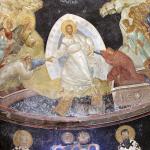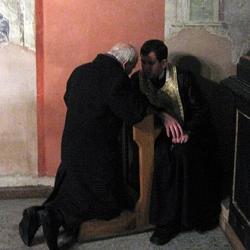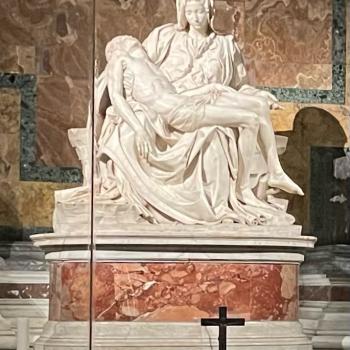
My family’s journey with TBI parallels my life of faith. So many ups and downs. So much time waiting. The initialism TBI (traumatic brain injury) could easily be confused with TBA (to be announced) and TBD (to be determined). Every day we wait in hope and love that Christopher will make some measure of progress, no matter how small. Some days Christopher responds. Other days he doesn’t, or at least not in a way that I can discern. But like faith, we do not know what is going on in the unseen realm of his neural activity. Every night, we return home looking forward to what the next day or next week might reveal—TBA and TBD. I am slowly learning to wait patiently for the patient—my son—to arrive! Call it patient waiting. This post is about the need to patiently wait in the life of faith.
I have never considered myself to be a patient person of deep and earnest faith. My Christian faith test results at various levels in the spiritual curriculum are such that I almost always end up having to retake the course. My adult son’s TBI has only made it more challenging, so much so that I have had to transfer to the school of hard knocks!
Recently in my studies, I called to mind how God’s words of revelation to Abraham, the father of faith, were often years apart. I readily forget this point as I read the accounts of Abraham’s journey of faith recorded in Genesis. I can read all the accounts of Abraham’s life in one sitting, but it would take an entire lifetime to wait on God like he did. After Abraham was “waiting patiently” for many years, God provided him and his wife Sarah their promised heir Isaac in their old age (Hebrews 6:15). However, Abraham and the rest of the saints of old did not receive the promised Messiah or enter the Promised Land and City of God in their lifetimes. The Epistle to the Hebrews tells us:
All these people were still living by faith when they died. They did not receive the things promised; they only saw them and welcomed them from a distance, admitting that they were foreigners and strangers on earth. People who say such things show that they are looking for a country of their own. If they had been thinking of the country they had left, they would have had opportunity to return. Instead, they were longing for a better country—a heavenly one. Therefore God is not ashamed to be called their God, for he has prepared a city for them … These were all commended for their faith, yet none of them received what had been promised, since God had planned something better for us so that only together with us would they be made perfect. (Hebrews 11:13-16; 39-40; NIV)
As I noted above, Abraham waited patiently for God to fulfill his promise to grant him an heir in his old age. He modeled what biblical faith entails: “And without faith it is impossible to please God, because anyone who comes to him must believe that he exists and that he rewards those who earnestly seek him.” (Hebrews 11:6; NIV)
Waiting patiently for what God has promised and earnestly seeking God is essential in the life of faith. God rewards them. But when? TBA. TBD.
The life of faith sure isn’t easy. All of life slows down as one waits for God rather than try and take matters into one’s own hands. Something similar happens with TBI. All of life slows down. I cannot speed up my son’s neuro activity no matter how hard I try. It is quite difficult to come to terms with the fact that I have no control over what ultimately happens. I can only aid the process by stimulating my son’s brain and advocate for good care. Will Christopher speak more frequently? Will he experience meaningful recovery? TBA. TBD.
I doubt it was very easy for Abraham or the other saints receiving honorable mention in Hebrews 11 to wait on God. Nor do I think it was easy for the disciples to wait for the promised Holy Spirit, as recorded in Acts 2. But at least in their case, the promise would be fulfilled within weeks. Jesus instructed them in one of his post-resurrection appearances: “Do not leave Jerusalem, but wait for the gift my Father promised, which you have heard me speak about. For John baptized with water, but in a few days you will be baptized with the Holy Spirit.” (Acts 1:4-5; NIV)
Eventually, Abraham and Sarah received the promised heir. The church also received the promised Holy Spirit. Still, none of them experienced the fullness of the kingdom in their lifetimes. It is striking that immediately following Jesus’ exhortation to his followers to wait for the Holy Spirit, the disciples asked him about the restoration of God’s kingdom. Note their question and Jesus’ response: “Then they gathered around him and asked him, ‘Lord, are you at this time going to restore the kingdom to Israel?’ He said to them: ‘It is not for you to know the times or dates the Father has set by his own authority. But you will receive power when the Holy Spirit comes on you; and you will be my witnesses in Jerusalem, and in all Judea and Samaria, and to the ends of the earth.’” (Acts 1:6-8; NIV) The disciples slowly came to the painful realization that Jesus was not returning soon to restore the kingdom. More waiting awaited them and all those who are people of faith.
The life of faith and waiting on God is exceptionally difficulty to maintain in contemporary society. Our day and age views time as a commodity. The grandfather clock gives way to the stopwatch, which judges whether someone is progressing well and rising the corporate ladder in the cult of efficiency. But time is not a commodity, but a gift of God, as John Swinton claims in Becoming Friends of Time. Similarly, faith is a gift, not a commodity. My son is also a gift, no matter the level of his brain damage. My child is not damaged goods, nor is anyone who has disabilities.
The good news of Jesus Christ is that God makes time for us no matter how efficient or smart and conscious or strong we are. In fact, those who are efficient or smart or strong are often least alert and conscious of God’s visitation. After all, God often appears in untimely, inefficient, and unassuming ways.
The movers and shakers in society are too busy seizing life and turning time, faith, and people into commodities to experience what really counts. Such a life is not promising for those with disabilities given their vulnerability against this backdrop. But if we were to hit the pause button, wait for a few moments, and reflect slowly and carefully, we might realize that such a life is not promising to any of us, since each of us is far more vulnerable than we care to imagine.
Those with disabilities are sometimes our greatest teachers. They help us to see that our lifetimes freed from the dictates of the stopwatch are not efficient, nor is faith, nor are relationships. Qualitative time, faith, and relationships are vulnerable and require constant attention and care. We must make every effort to see that only as we slow down and take time to cultivate them will we find life to be filled with promise.
Christopher was and is a child of promise. My wife and I prayed for a child for several years. We waited and prayed for him, and finally news came that Mariko was pregnant. We waited and prayed for him even after the birth pangs ensued. He was so long in coming out into the early morning light of day. It seemed like ages as we waited for our firstborn child to appear.
As any parent knows, mothers and fathers never stop experiencing pain over their children. They continue to labor over them no matter how old they get. So it is with our twenty-seven-year-old son. The only difference is that in some ways he is even more dependent on us and medical care providers than on the day of his birth given the nature of his TBI. Perhaps the greatest pain is not knowing the future, waiting for signs of meaningful recovery. In our experience, TBI can also be spelled TBA and TBD.
Last night, my wife reported that Christopher’s CNA (certified nursing archangel in her case) shared that Christopher may have said “Good morning” to her yesterday in the early morning light at the beginning of her shift. It is not surprising that the CNA was not certain, even though she is very alert. After all, she didn’t expect Christopher to speak, and she was very busy tending to various matters in the room on his behalf. Weeks have passed since the last time Christopher spoke in her presence. To this point, Christopher provides no hint as to when he is about to speak. He gives no signal. He doesn’t even hit his call light button as if to clear his throat to make an announcement. We are all working according to the TBA and TBD timetable as to when Christopher determines to talk to us.
I wonder if Abraham ever pondered whether God spoke to him on a given occasion. Like the young Samuel, maybe there were times he thought someone else was speaking to him (See 1 Samuel 3). Or perhaps like me, he couldn’t determine if his mind was playing tricks on him. But one thing I do know. God wants me to patiently wait and earnestly seek God to fulfill the promise to restore Christopher’s fortunes in Jesus in God’s kingdom, and to give the Holy Spirit to those who ask. After all, Jesus declared, “If you then, though you are evil, know how to give good gifts to your children, how much more will your Father in heaven give the Holy Spirit to those who ask him!” (Luke 11:13; NIV)
I readily acknowledge Jesus’ words. I may be “evil,” but I do give good gifts to my children. And so, I pray that God will give Christopher the greatest gift by faith. Waiting patiently between Jesus’ ascension and the Spirit’s descent at Pentecost, I pray earnestly: Lord, grant Christopher the Holy Spirit. May you fire and rewire his neurons and ignite his tongue to declare your praises in Jerusalem, Judea, Samaria, and to the ends of the earth. I wait patiently and earnestly seek you.
No matter the TBA and TBD, I’m learning to keep the faith with TBI. Patient waiting.
“News Alert” correction to my blog post yesterday: I spoke with the same CNA yesterday afternoon. She corrected what I wrote. She is “confident” that Christopher spoke to her a little after 6 am Saturday, saying “Good morning.” Another CNA was with her at his door. They were talking about matters on the floor around shift change. They turned and saw he was looking at them. They both heard him say “Good morning”! Now if he would only say “Good morning” to me. But I would settle for anything my son would like to say to me, even “Good riddance”!














